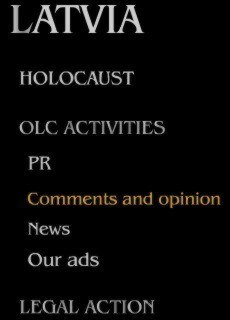This
week I took part in a protest against those who paint the
Waffen-SS as heroes. Britain should take a similar stand
Ever since the marches of Latvian SS
veterans have been held on 16 March in Riga, I have been involved
in the efforts to convince the local authorities to ban these
ceremonies. There were a few years when we succeeded, but for
the most part the marches have continued to the consternation
of the Russian residents of Latvia and those who oppose the
honouring of individuals who fought alongside the Nazis to
achieve a victory of the Third Reich.
This Tuesday, for the first time, I actually saw the march with my own eyes and
had an opportunity to join a peaceful protest staged by local
anti-fascist demonstrators. It was a shocking and utterly
disheartening sight to see over 1,000 people gathered in
subfreezing weather to honour Waffen-SS units, among whose
soldiers were several of the biggest mass murderers of Jews
during the Holocaust.
As emotionally distressing as the
ceremony was for me personally, however, its most problematic
and disturbing aspect was the manner in which the symbols
of renewed Latvian independence were exploited to honour
the service of the members of the Latvian Legion – thereby
reinforcing the myth that they were freedom fighters for
their country's independence, as opposed to fighters in the
service of Nazi Germany, a regime which bears direct responsibility
for the mass murder of tens of millions of innocent civilians.
Thus two rows of young Latvian nationalists waving the flags
of democratic Latvia, a member in good standing of the European
Union and Nato, stood as an honour guard at the Freedom Monument
as the procession of veterans came to lay flowers and wreaths
at its base.
Staging the ceremony at the Freedom
Monument, probably the most cherished symbol of Latvian independence
and opposition to the Soviet occupation, and incorporating
the use of current Latvian flags, gave the event an aura
of ostensible official recognition that was not in fact the
case. (No government officials participated.) Even worse,
it sent a message that the new Latvia salutes the Latvian
Legion, despite the fact that among its members were mass
murderers and Latvia's most ardent supporters of Nazi Germany.
Standing among the demonstrators against
the march and listening to the hateful exchanges between
the two sides was both frustrating and infuriating. Were
the pro-Legion marchers aware of the fact that there was
never any indication that the Nazis intended to grant Latvia
independence? Were they aware of the terrible crimes committed
by the self-declared Latvian patriots who were among those
who volunteered for service in the Waffen-SS Latvian Legion?
It appeared as if these facts were irrelevant to the supporters
of the march, who were driven by hatred of the Soviets more
than any other element.
In reality, Tuesday's ceremony was
in certain respects only the tip of a very dangerous iceberg
that is attempting to rewrite the history books and create
a false symmetry or equalisation of Communist and Nazi crimes.
And while the march was not organised by the government,
it is obvious that there is strong support for its message
among Latvian leaders. Thus, for example, yesterday Latvia's
foreign minister Maris Riekstins issued an official statement
in which he attacked my criticism of the march and attempted
to equate the suffering of all the victims of the second
world war, as if there was no difference between those supporting
Nazism and those opposing it.
The question facing the European Union
and especially Britain (given the Conservative's alliance
with march supporters, For Fatherland and Freedom), is whether
they will finally realise how dangerous this movement of
Holocaust and second world war distortion is and take the
necessary measures to defeat it, before it defeats us.
guardian.co.uk |


